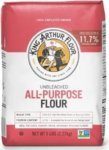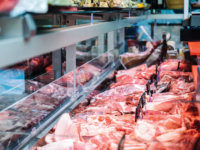Vermont’s King Arthur Flour recalled 14,218 cases of Unbleached All-Purpose Flour due to potential contaminated with E. coli. King Arthur has been informed by ADM Milling Co. that wheat used to make these lots of King Arthur flour has been linked to an ongoing outbreak of E. coli infections. Three weeks ago, ADM Milling wheat triggered a recall for ALDI’s Baker’s Corner flour after it was linked to an outbreak of E. coli in flour. King Arthur four is being recalled due to the same wheat. It is not clear if other flours may also have been made with the same contaminated wheat, or why it has taken so long for another potentially contaminated product to be identified. On May 23, 2019, 5-pound bags of Baker’s corner flour were recalled by ADM Milling Co and ALDI after health officials linked the product to the outbreak using Whole Genome Sequencing. The test identified the “genetic fingerprint” of the E. coli O26 outbreak strain in an unopened bag of flour where one of the case-patients ate before becoming ill. The original outbreak has sickened 17 people in eight states and hospitalizing three of them. California, Connecticut, Missouri, and New Jersey each reported one illness. Pennsylvania and Rhode Island each reported two and New York and Ohio each reported five. No illnesses have been reported to date in connection with King Arthur Flour. @ https://www.fda.gov/safety/recalls-market-withdrawals-safety-alerts/association-adm-milling-co-king-arthur-flour-inc-voluntarily-recalls-limited-quantity-unbleached-all?utm_campaign=ADM%20Milling%20Co%2C%20King%20Arthur%20Flour%2C%20Inc.%20Voluntarily%20Recalls%20Limited%20Quantity%20of%20Unbleached%20Flour&utm_medium=email&utm_source=Eloqua
Andrea-M
https://www.fda.gov/safety/recalls-market-withdrawals-safety-alerts/association-adm-milling-co-king-arthur-flour-inc-voluntarily-recalls-limited-quantity-unbleached-all?utm_campaign=ADM%20Milling%20Co%2C%20King%20Arthur%20Flour%2C%20Inc.%20Voluntarily%20Recalls%20Limited%20Quantity%20of%20Unbleached%20Flour&utm_medium=email&utm_source=Eloqua
Andrea-M
Vermont’s King Arthur Flour recalled 14,218 cases of Unbleached All-Purpose Flour due to potential contaminated with E. coli. King Arthur has been informed by ADM Milling Co. that wheat used to make these lots of King Arthur flour has been linked to an ongoing outbreak of E. coli infections. Three weeks ago, ADM Milling wheat triggered a recall for ALDI’s Baker’s Corner flour after it was linked to an outbreak of E. coli in flour. King Arthur four is being recalled due to the same wheat. It is not clear if other flours may also have been made with the same contaminated wheat, or why it has taken so long for another potentially contaminated product to be identified. On May 23, 2019, 5-pound bags of Baker’s corner flour were recalled by ADM Milling Co and ALDI after health officials linked the product to the outbreak using Whole Genome Sequencing. The test identified the “genetic fingerprint” of the E. coli O26 outbreak strain in an unopened bag of flour where one of the case-patients ate before becoming ill. The original outbreak has sickened 17 people in eight states and hospitalizing three of them. California, Connecticut, Missouri, and New Jersey each reported one illness. Pennsylvania and Rhode Island each reported two and New York and Ohio each reported five. No illnesses have been reported to date in connection with King Arthur Flour. @ https://www.fda.gov/safety/recalls-market-withdrawals-safety-alerts/association-adm-milling-co-king-arthur-flour-inc-voluntarily-recalls-limited-quantity-unbleached-all?utm_campaign=ADM%20Milling%20Co%2C%20King%20Arthur%20Flour%2C%20Inc.%20Voluntarily%20Recalls%20Limited%20Quantity%20of%20Unbleached%20Flour&utm_medium=email&utm_source=Eloqua
https://www.fda.gov/safety/recalls-market-withdrawals-safety-alerts/association-adm-milling-co-king-arthur-flour-inc-voluntarily-recalls-limited-quantity-unbleached-all?utm_campaign=ADM%20Milling%20Co%2C%20King%20Arthur%20Flour%2C%20Inc.%20Voluntarily%20Recalls%20Limited%20Quantity%20of%20Unbleached%20Flour&utm_medium=email&utm_source=Eloqua
Andrea-M
The USDA is pursuing the privatization of food safety inspections in beef slaughter plants.
According to documents obtained by Food & Water Watch via the Freedom of Information Act, Tyson Foods recently requested a waiver to allow Tyson employees to conduct more inspections in place of USDA food safety inspectors. “This dangerous proposal could rid beef slaughter plants of most government inspectors,” said the Food & Water Watch in a statement. According to the article, the USDA is planning to “deregulate the inspection system for beef slaughter plants,” just like they did in the poultry and pork sectors over 20 years ago. In 1998, the USDA’s Food Safety and Inspection Service (FSIS) allowed for the number of federal inspectors to be replaced by company employees at two dozen poultry plants and five hog slaughter plants. In 2014, this system included the entire poultry industry. In 2018 the pork industry followed with the FSIS creating the New Swine Slaughter Inspection System.
According to the Food & Water Watch, this puts consumer safety at risk, as companies are likely to inspect themselves differently than if an outside regulator was to. According to the USDA Office of the Inspector General, “We… found FSIS could not determine whether the goals of a pilot program… were met because FSIS did not adequately oversee the program. In the 15 years since the program’s inception, FSIS did not critically assess whether the new inspection process had measurably improved food safety at each (pilot) plant, a key goal of the program.” @ https://www.nationofchange.org/2019/06/12/the-usda-wants-to-privatize-food-safety-inspections/
“This dangerous proposal could rid beef slaughter plants of most government inspectors.”
Andrea-M
The FDA announced that Townsend Farms, Inc. has notified Costco that a recent FDA test indicated that a domestic conventional frozen blackberry product manufactured by Townsend Farms, Inc., may be contaminated with Hepatitis A. The domestic conventional frozen blackberry from Townsend Farms was used to manufacture the Kirkland Signature Three Berry Blend product. The product has a Best By Dates between February 16, 2020, and May 4, 2020. The product was sold in Costco stores located in San Diego and Los Angles, California and Hawaii. No product manufactured for Costco by Townsend Farms has tested positive for Hepatitis A. Costco has no product in its current inventory. Costco has been notifying its members about the potential health risk. According to the FDA and CDC, there have been no customer illness reports to date related to any product manufactured by Townsend Farms, Inc., using these blackberries. @ https://www.fda.gov/safety/recalls-market-withdrawals-safety-alerts/townsend-farms-inc-notifies-costco-possible-health-risk-and-recalls-conventional-frozen-kirkland
https://www.fda.gov/safety/recalls-market-withdrawals-safety-alerts/townsend-farms-inc-notifies-costco-possible-health-risk-and-recalls-conventional-frozen-kirkland



